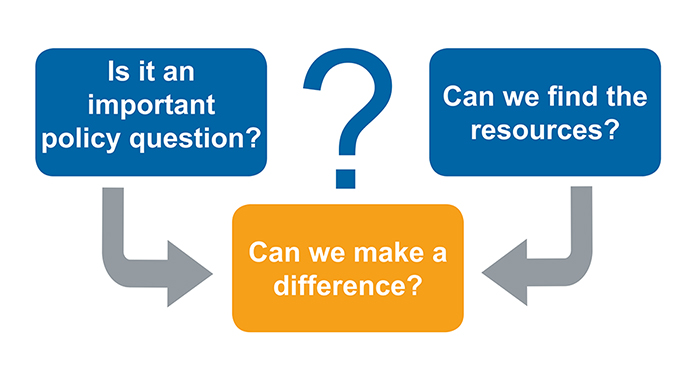How Do We Set Priorities?
Northern Policy Institute staff are tasked with operationalizing the strategic direction supplied by the Northern Policy Institute Board. As outlined above, however, there are many players involved in the ongoing process of setting, assessing and re-setting policy priorities and strategic direction. This "many hands make light work" approach applies to the operational as well as the strategic side of Northern Policy Institute. Just as the Board sets Northern Policy Institute strategic goals in the context of the broader community concerns and the wider social, environmental and economic situation (regionally, nationally and internationally) so too does staff when selecting specific projects to move the strategic goals forward.
In deciding to undertake a specific project or policy challenge, staff are focused on three questions:

The last two questions are the easiest.
If a multitude of groups or organizations are already engaged on a file or if the subject is, or has already been well explored and the evidence thoroughly vetted, Northern Policy Institute can add little value.
Similarly, availability of expertise or the resources to hire it, is readily quantifiable. Where work has to be done and the resources are not immediately available, Northern Policy Institute will pursue them. This is why Northern Policy Institute’s internal structures will include both fundraising capacity as well as a focus on attracting and training new young researchers and policy experts. Northern Policy Institute will also, of course, have ongoing efforts to identify external experts in Northern Ontario or experts on issues impacting Northern Ontario.
Deciding whether an issue is an "important policy question" is less clear cut. What is a life-and-death issue for some, may be a marginal issue to others. Take the licensing of taxis or the pricing of their services in Thunder Bay. For drivers and their passengers, these issues are of signal importance. For a large percentage of the population (those who don’t take cabs or those who don’t live in Thunder Bay) the issue is considerably less pressing.
This is where ALL stakeholders come in. In ranking the importance of a policy issue, staff will consider the following types of factors:
- Are people talking about it?
- Headlines, letters to the editor, direct feedback via the Northern Policy Institute online consultation tool
- Are the experts working on it?
- "ivory tower" academics, "bureaucrats", "vote obsessed" politicians; all are good and reliable leading indicators of future issues
- Are government initiatives proposed or underway to respond to it?
- Federal, provincial, municipal
- Are stakeholders and interest groups focusing on it?
- Industry and professional associations, Unions, Chambers, Grassroots community orgs, opposition parties
These questions are not presented in a random order.
When judging the importance of a policy question, Northern Policy Institute will first and foremost be driven by the input of everyday Northerners. We will seek them out through direct outreach at community and Northern Policy Institute events, through social media and through our online citizen’s panel. The priorities of organized interests (governments, political parties, municipal associations, chambers of commerce) are not necessarily the same as the people of Northern Ontario, even the people these groups are designed to represent.
Next to the general public, policy and subject experts are Northern Policy Institute’s next most reliable source of guidance on the relative importance of competing issues. Experts in the field are less likely to be driven by specific parochial interests and so are the next highest source of information on the importance of any given policy issue or the urgency of a given project idea. Their input is comparatively more valuable because their professional reputation and community standing can be harshly impacted by being openly and consistently biased in any given direction.
Next to the experts come governments themselves. Not the governing party, but the government. Governing is about compromise and the balancing of competing interests. If scarce public resources are being expended on exploring or addressing an issue this is often, but not always, evidence of high relative importance vis a vis other issues facing our communities.
Finally, the organized interests must be considered. Their issues and priorities, by definition, reflect their narrow biases, interests and wants (and always must be considered in that context). The fact that a collective has arrayed themselves around a specific issue is prima facie evidence of its importance to at least a sub set of Northern Policy Institute’s stakeholder constituency.
